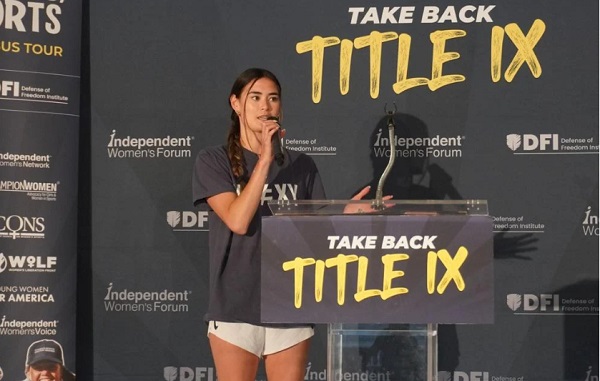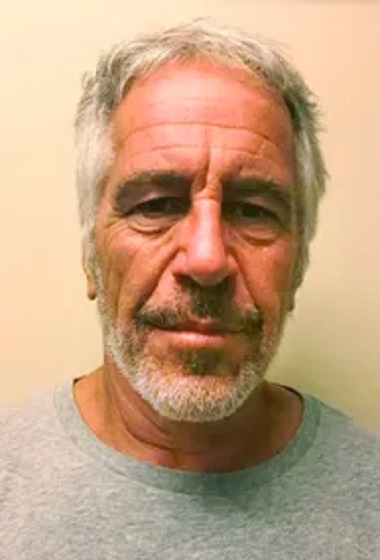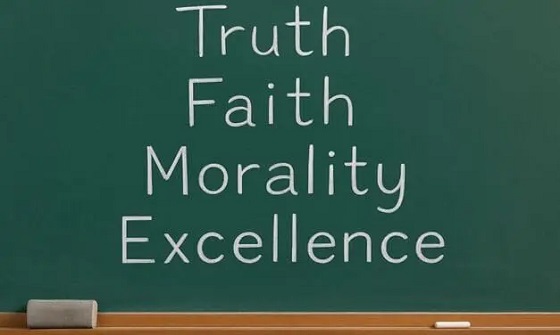International
Biden admin Title IX rule blocked in four more states, bringing total to 26

Paula Scanlan speaks during a stop for the Independent Women’s Forum as it rolls across the country on the Our Bodies, Our Sports ‘Take Back Title IX’ Summer 2024 Bus Tour.
From The Center Square
By
A federal appeals court has ruled that the Biden administration can’t implement its Title IX rules in an additional four states, bringing the total number of statewide injunctions to 26.
With a recent block awarded in Oklahoma on Wednesday and then an emergency appeal granted by the United States Court of Appeals for the Eleventh Circuit, over half of the United States will be exempt from the Thursday deadline.
The new Biden administration rules add gender identity to prohibitions on sexual discrimination in Title IX, including requiring schools to allow students to use a bathroom and locker room that aligns with their gender identity.
Alabama, Florida, Georgia and South Carolina are the latest states where the Department of Education cannot implement the updated rules that expanded federal sex discrimination protections to cover gender identity and pregnancy.
“The Department is enjoined from enforcing the final rule adopted on April 29, 2024, Nondiscrimination on the Basis of Sex in Education Programs or Activities Receiving Federal Financial Assistance…pending further order of this Court,” the court’s order reads.
The other 21 states where the Biden administration has been prohibited from implementing its rule expanding the definition of sex discrimination to include gender are Alaska, Idaho, Indiana, Kansas, Kentucky, Louisiana, Mississippi, Montana, Ohio, Tennessee, Texas, Utah, Virginia, West Virginia, Wyoming, Arkansas, Missouri, Iowa, Nebraska, North Dakota and South Dakota.
After the rule’s final implementation in April, the Biden administration was challenged by a spate of lawsuits from states, organizations and individuals arguing the rule was unconstitutional.
In the case led by Alabama, a lower court ruled against issuing a preliminary injunction on Tuesday, leading the coalition of states and organizations to file an appeal late into the evening. They asked the appellate court to issue an emergency block on the rule, citing its effects on students and schools.
“The Title IX rule not only immediately jeopardizes the rights and safety of students,” the request for an injunction reads. “But it also requires schools to digest the rest of the 423-page rule, update their policies, retrain their employees, figure out how to reconcile contrary state laws, and more. And the rule’s effective date is hours away.”
The Department of Education maintains that it is lawfully protecting students who are liable to face discrimination, including transgender students. The rules require schools to allow students to use a bathroom that aligns with their gender identity.
Critics say that it removes the protections created by the 1972 statute prohibiting sex discrimination in the nation’s academic institutions.
• This story first published at Chalkboard News.
Great Reset
U.S. rejects WHO pandemic amendments, citing threat to sovereignty

Quick Hit:
- The U.S. State Department and HHS transmitted the official rejection of the 2024 amendments to the WHO’s IHR.
- Officials cited threats to national sovereignty, vague terminology, and the WHO’s political susceptibility—particularly to China—as grounds for rejection.
- The amendments would have mandated WHO-led responses, digital health documentation, and “equitable access” initiatives regardless of U.S. withdrawal from the WHO.
RFK Jr. just announced he has rejected the WHO’s draconian new pandemic treaty.
Every American should care about this.
“Last year, the World Health Organization’s governing body made some far-reaching amendments to its international health regulations, otherwise known as the… pic.twitter.com/GI9UzsTrKv
— MAHA PAC🗽 (@MAHA_PAC) July 18, 2025
Diving Deeper:
The rejection represents a sharp rebuke of the World Health Assembly’s 2024 amendments to the International Health Regulations (2005), which sought to centralize global pandemic decision-making power within the WHO. Kennedy and Rubio emphasized the amendments’ “vague and broad” language and their potential to create policy rooted in politics and global “solidarity” rather than science and national interest.
Among the most controversial changes were new authorities for the WHO to unilaterally declare health emergencies, coordinate international responses, and guide member states toward “equitable access” to vaccines and other health commodities. The amendments also encouraged countries to implement digital health documents—raising red flags for privacy and surveillance concerns.
“The amendments risk unwarranted interference with our national sovereign right to make health policy,” the joint statement read. Kennedy and Rubio specifically criticized the lack of public input in drafting the new rules and warned that WHO directives could suppress legitimate scientific debate and restrict Americans’ freedom of speech under the guise of “controlling misinformation.”
The officials pointed to the WHO’s well-documented failures during the COVID-19 pandemic, including its deference to the Chinese Communist Party, as a stark example of why international bodies should not be granted binding authority over U.S. domestic policy. “These amendments… fail to adequately address the WHO’s susceptibility to political influence and censorship—most notably from China—during outbreaks,” the statement noted.
Even more alarming, the statement highlighted that the amended rules would have bound the U.S. regardless of its current status in the WHO, essentially imposing obligations on a nation that is no longer part of the organization. This drew particular concern from Rubio, who has long warned against ceding U.S. autonomy to global institutions.
In reaffirming their commitment to “put Americans first,” Kennedy and Rubio vowed to continue resisting international encroachments on U.S. freedoms. “We will not tolerate international policies that infringe on Americans’ speech, privacy, or personal liberties,” they declared.
This formal rejection marks a victory for critics of globalism and top-down health mandates, signaling that under the current administration, American decision-makers are prioritizing sovereignty, transparency, and constitutional protections over global consensus driven by unelected bureaucrats.
Crime
Former Epstein lawyer: There was never a client list

Quick Hit:
Jeffrey Epstein’s former attorney Alan Dershowitz says there was never a “client list,” calling the claim fiction in a Wall Street Journal op-ed. He also defended President Trump, saying there’s no evidence of any improper or questionable behavior.
Key Details:
- Dershowitz wrote that Epstein “never created a ‘client list,’” and clarified that the FBI only documented names brought up by alleged victims in interviews, which were redacted in released files.
- He stressed that none of the redacted names are current officeholders and added that the veracity of the accusations remains unknown.
- Dismissing rumors of hidden cameras used to entrap guests, Dershowitz said surveillance tapes existed only in public areas and were installed by law enforcement—not Epstein.
Diving Deeper:
In a Wall Street Journal op-ed this week, constitutional attorney Alan Dershowitz addressed lingering speculation surrounding the late Jeffrey Epstein, his alleged surveillance operation, and his reported ties to public figures. Dershowitz, who represented Epstein years ago and has consistently challenged many media narratives surrounding the case, said the facts don’t support the sensational claims.
“Epstein never created a ‘client list,’” Dershowitz wrote, pushing back on the widely circulated notion that Epstein maintained a record of high-profile individuals for the purpose of blackmail. He clarified that the FBI had compiled names mentioned by alleged victims during interviews, but that those names were redacted in publicly released documents. “We don’t know whether the accusations are true,” he added. “The names mentioned don’t include any current officeholders.”
Dershowitz also sought to debunk claims that Epstein maintained a secret camera system in his guest bedrooms to entrap powerful visitors. “There are videotapes, but they are of public areas of his Palm Beach, Fla., home,” he wrote. According to Dershowitz, those surveillance cameras were installed by police after Epstein reported that money and a firearm were stolen from the property. “I am not aware of video cameras in guest bedrooms,” he added.
Turning to President Donald Trump, Dershowitz flatly denied that any evidence exists linking him to wrongdoing. “Open records show an acquaintance between Epstein and President Trump many years ago,” he wrote, before emphasizing that the relationship ended long ago. “That relationship ended when President Trump reportedly banned Epstein from Mar-a-Lago, long before becoming president the first time.”
“I have seen nothing that would suggest anything improper or even questionable by President Trump,” Dershowitz concluded.
His remarks arrive amid a resurgence of political and media interest in Epstein’s associations. But Dershowitz’s message is clear: much of the speculation is unsupported by evidence, and President Trump’s name should not be dragged into narratives that have no basis in fact.
-

 Education1 day ago
Education1 day agoWhy more parents are turning to Christian schools
-

 Alberta1 day ago
Alberta1 day agoOPEC+ is playing a dangerous game with oil
-

 Alberta1 day ago
Alberta1 day agoUpgrades at Port of Churchill spark ambitions for nation-building Arctic exports
-

 Business1 day ago
Business1 day agoIs dirty Chinese money undermining Canada’s Arctic?
-

 COVID-191 day ago
COVID-191 day agoJapan disposes $1.6 billion worth of COVID drugs nobody used
-

 conflict1 day ago
conflict1 day agoOne of the world’s oldest Christian Communities is dying in Syria. Will the West stay silent?
-

 COVID-191 day ago
COVID-191 day agoWATCH: Big Pharma scientist admits COVID shot not ‘safe and effective’ to O’Keefe journalist
-

 Bruce Dowbiggin1 day ago
Bruce Dowbiggin1 day agoHow Did PEI Become A Forward Branch Plant For Xi’s China?




